1970 Home
30th Reunion
Class News
Memories
Email
In Memoriam
Special Recognition
Our Fathers' Stories
Charleston
Feedback
|
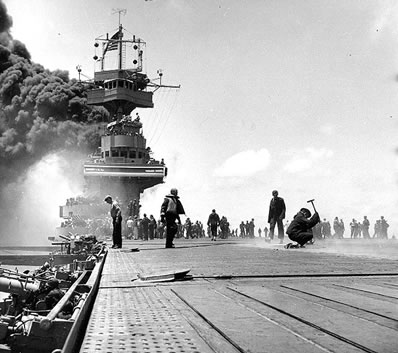
The USS Yorktown (CV-5) - The Battle of Midway
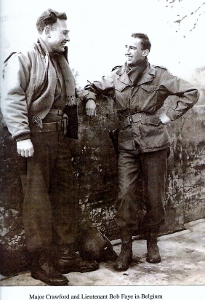
Ken Crawford - on left- in Belgium
JD Crawford - R" Company...His Dad, Colonel Kenneth C. Crawford...was drafted in 1941 and went to Field Artillery School at Fort Bragg, NC.
Soon thereafter, he was sent to Field Artillery OCS at Fort Sill, OK were he graduated and was commissioned a 2nd. LT. He continued FA training until his assignment to
9th Army as the G- 3 Air Targeting Officer. The 9th Army was deployed to Bristol, England in 1944...on the Queen Elizabeth. Soon they deployed to the
European Theatre right after D- Day.He worked with many units gathering targets for Tactical Air. Before separating in 1946, he was promoted to Major and
awarded the Bronze Star, The Belgian and French Fourrageres. He went back to college and got his BS and started Law school at Washington University until the
Army offered him a regular commission to return. The Army then sent him to Law School at The University of Virginia. He started his JAG career and served in
many locations until he retired in 1970 right after he commissioned Bill Aubrey and me at the Citadel.After he retired from the Army, he became the Director
of Education and Training of the Federal Judicial System. During his early years in High School, College and at Fort Bragg, he was a Golden Gloves Competitor.
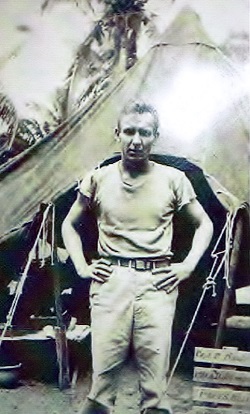
Ted Bell, Jr.- "H" Company.....His Dad, Col. Ted Bell- US Army, Ret- "C" Company, Citadel Class of 1944
2ndLt. Ted Bell, a 25 year old officer in Easy Company of the 77th Division- The Statue of Liberty Division- fought in the decisive battle
for control of the island of Okinawa. He left the Citadel early in 1942 to join the 77th in campaigns on Guam and in the
Philippines before they landed on Okinawa. On 17 May, 1945, 2Lt. Bell and his 200 man company were ordered to conduct a near-suicidal
night assualt on a heavily fortified ridge. Once reaching their objective, the company dug foxholes and were pummeled with enemy artillery and small arms fire from all sides. When the company was relieved by other troops after three days, Bell had 22 men left. His and his company's actions
allowed the rest of the division and in turn the American forces to breach the Japanese lines and win the final battle of World War II. For his actions during those days,
he was awarded The Distinguished Service Cross (the second-highest decoration for valor in combat). Earlier, Ted had been awarded the Silver Star and two Bronze Stars.
The Battle of Okinawa cost the lives of more than 20,000 U.S. troops, soldiers and Marines as well as 180,000 Japanese soldiers and civilians.
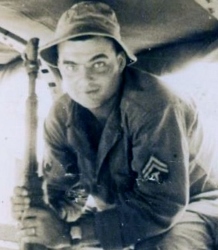
Ronnie Beasley- "F Troop"....My Daddy, Doug Beasley....was a TSgt in the Army Signal Corps stationed at Pearl Harbor...no, he was not involved with the communications
SNAFU of the surprise attack. After the major clean-up effort by the Army and Navy, he was recruited/drafted to play football for teams that toured the forward areas to
entertain the troops. He had played at the University of Georgia before going to Comm training in Texas, Arkansas, and Oklahoma. He was on the "All-Star" team in Hawaii.
He would have made a GREAT Senior Private!!!
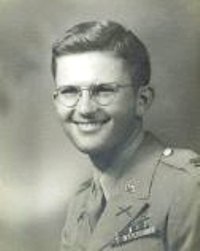
Marsh Helena- "E/RegStaff".....His Dad, Col. Cecil Helena- US Army, Ret.....was an infantry officer out of Oklahoma A&M. He was initially assigned to an amphibious engineering battalion
as a company commander and was involved in all the landing along the coast of New Guinea where he was wounded in a straffing attack. After repeated requests, he was finally reassigned to "G" Company, 1st Infantry Regiment,
6th Infantry Division. Shortly thereafter, the company found itself on a razor-backed ridge on the main Philippine island of Luzon. The terrain was so trecherous that all
food, water and ammo had to be supplied by burros. The companies were basically cut-off from each other so the only mutual support was from artillery. Cecil was wounded again during
a night movement to another location. He was Evac'ed to the Leyte hospital and patched up. He felt bad that he was having too much fun (right next to the San Miguel brewery) so he "escaped"
back to his unit. They then proceeded toward Bataan, using the same route of the imfamous " Bataan Death March". They continued to be battered by the Japaneese, now using "Banzai" attacks at
night. After several years in-theatre, he had enough points to be allowed R&R back in the states. His new orders assigning the company to prepare for the invasion of the
Japaneese Islands when he returned from home. Luckily, President Truman ordered the Big Bomb used and that saved untold numbers of American lives. Dad went on to a 28 year career,
including the 11th Airborne, 82nd Airborne and the 101st Airborne Divisions. My proudest moment was when he administered my commissioning oath on Graduation Day. During my
entire career, when faced with an obstacle, problem, or challenge, I always asked myself, "What would Dad do?"....it never failed me. Best wishes to all, and greatest respect for our
Dads. What a generation!!!!
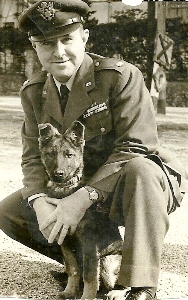
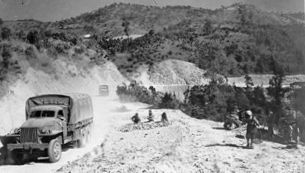
The Burma Road
1942
Pep McPhillips- "I" Company...his Dad, Col Henry McPhillips- US Air Force, Ret. My Dad like many others was almost silent about the events of WW II. In
the late 30's, he was The Cat of the Walk in Mobile, Alabama (Merchant Marines). He graduated from Springhill College. When General Claire Chennault asked for pilot and maintenance volunteers to go with
him to China, Dad volunteered with the 1st American Volunteer Group- "The Flying Tigers"- as a OIC in the aircraft maintenance unit...they lost a lot of young officers during that time period from air attacks by the Japanese.
In July 1942, The Flying Tigers were transfered back in to the Army Air Corps and designated the 23rd Fighter Group. Later, Dad would up in North Africa. After the war, he started his own business in Moblie,
only to be recalled to active duty for the Korean Conflict. We were stationed in Asaka, Japan where Dad was the Base Executive Officer. Upon return to the "states", the Air Force
thought Dad should get more college, so they sent him to Harvard for the Executive Officers' Course. He returned to Brookley Field in Mobile, were he was the
Public Information Officer. From there to Hawaii at PACAF HQ, Okinawa, Oklahoma City, and Gunter AFB in Montgomery, AL. He retired in 1966 and became the General
Manager of Quail Hollow Country Club in Charlotte, NC. He and Mom finally moved back to their hometown, Mobile, and Dad took over as General Manager of the Athelstan Club
in downtown Mobile until he finally retired for good in 1983. I lost him 24 December 1987. To me he was bigger than life, my hero, my Dad.
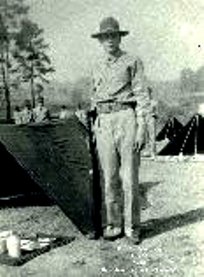
Ray Mechling- "T" Company...his Dad, Roy Earl Mechling... was in the Battle of the Bulge in the 106th Infantry Division. He was the NCOIC of the Division Reconnaisance Platoon. The platoon held out for three days against German Armored Divisions. The division was almost totally wiped out. His Dad survived but was captured. His brutal
treatment while a P.O.W. affected the rest of his life. Prior to being captured, Dad was wounded several times. Not long ago, he was awarded, by the Army, the Bronze Star with "V" for valor for his actions those many years ago.
The Army post Commander at Fort Jackson, SC, Col Jim Anderson- Class of 1969, presented the award at the Memorial Day parade...where the 106th was initially activated. We'll never know or appreciate the sacrifices of many of our forefathers."
The Rest of the Story...Ray's Great Uncle, Henry W.B. Mechling was born in 1851 in Westmoreland County, PA. In 1870 he joined the cavalry where he was a blacksmith and a sharpshooter
assigned to the Quartermaster Corps for the infamous 7th Cavalry. His last combat action began at the Little Big Horn on 25 June 1876 and almost ended in his death. As we know,
LtCol George Custer divided his command into three Battalions. My Uncle was in one of the two that survived the onslaught by Sitting Bull. Custer was attempting to move
the Sioux and Cheyenne to new reservations. Uncle Henry was assigned to "H" Company which was ordered to move the mule pack trains along the Little Big Horn river. A second
battalion attacked the village on the plains while Custer led a frontal assault with five companies. Custer, of course, was wiped out, the second battalion was thrown back so
the two surviving battalions regrouped and dug in on the bluffs over looking the battlefield. At the time no one know of Custer's fate. The indians soon turned their attention...
all 3000 of them...on the dug in troops. The troopers soon ran out of water in the blistering heat. Captain Bentee, the commander, asked for volunteers to sneak down to the river
to get water. Uncle Henry and three more sharpshooters volunteered to go with the men to provide cover as they filled canteens. All of those volunteers were awarded
The Congressional Medal of Honor for courage above and beyond the call of duty. Great Uncle Henry passed away in 1920, unfortunately, in "an Old Soldiers' Home".
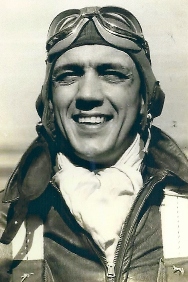
Woody Woodside- Band Company...his Dad, Milton H. Woodside- Class of 1940...flew P-40's in the 20th Pursuit Squadron at Clark Field in the Philippines. He
was captured on April 9th, 1942 and survived the Bataan Death March. He spent three and a half years as a P.O.W. in Japan. After the war, he went back to North Carolina and met my Mom.
They had five children. Dad continued on to Duke University and became a very successful hospital administrator; he passed away in 1973. I had the fortune to room in his room my
senior year and wear his sword and his peacock feathers. Lastly, I believe his proudest moment was presenting me my diploma....
Skip Evans- "O" Company...his Dad, Virgil "Buddy" Evans- "O" Company, Class of 1944...then US Marine Corps 1stLt, watched the five Marines and one Navy Corpsman raised the American Flag on Mount Suribachi,
Iowa Jima on that fateful Easter Sunday day in 1945. He was on the Battleship Tennessee which was so close to the shore that they were taking small arms fire. During one of the over 200
or so Kamikazes and torpedo attacks, he was badly wounded. Dad spent several months in the hospital before being released. After the war, he became general manager for two
local TV stations and the President of the S>C> Broadcasters' Association. The Class of 1944 left school in their Junior year to fight in the war. The Citadel broke tradition and awarded the Class
their rings a year early. My grandfather- Jesse Brockman- "O" Company, Class of 1898, was the first class to graduate after the Civil War. My son- Barry Evans- "O" Company,
Class of 1998...served in the Georgia Air National Guard until he switched to the USAF Reserves, where he flies C-17s in Charleston.
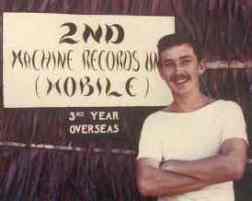
Bob Nance- "M" Company...his Dad, Robert B. Nance...served in the South Pacific during WW II. He often spoke of the rain, jungle rot, and waiting...waiting.
he spoke of the D-Day type invasion planned for mainland Japan. He was to be a participant in that endeavor, having made nine previous amphibious landings under hostile fire.
Dad felt that an invasion of that magnititude was probably a suicide mission, considering Japan's geography and prevailing Japanese attitudes. He was grateful
for the atomic bomb- a turning point of history, and probably the reason I am here today. 150 men in his unit left the Presidio, San Fransico, CA. in 1942. Only 3 made it home.
Dad was one of them.
Chip Coffee- "M" Company...his Dad, Bob Coffee,...was a Sophomore at Georgia Tech when WW II broke out. He dropped out and joined the Army Air Corps. The Army sent him to
Officer Candidate School (OCS) and then to Navigator School. He was shipped out to fly B-24's in the Pacific Theater. His plane was hit many times but he and his crew survived.
When the war was over, he stayed for an additional 6 months to fly home American P.O.W.s He was honored with an Air Medal and reached the rank of Captain. Upon his return home,
he continued to serve in the USAF Reserves for 20 years before retiring. He saw first hand the torture inflicted on our fighting men and for the rest of his life would never buy a car made in Japan.
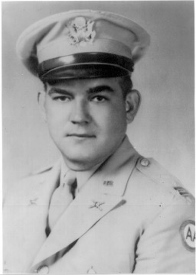
Bubba Kennedy- "G" Company...his Dad, Major "Stump" Kennedy, US Army Ret- Class of 1941...was in the Pacific Theater in New Guina and the Philippines. He spoke very little about
what happened during those times. He was retired medically as a major. These were our fathers, uncles, cousins, and neighbors. Many of our heroes never returned home. Dad
was the Captain of the Citadel 1940 Football Team. He was inducted into the Citadel Athletic Hall of Fame in the late 1990's.

Mike Rogers- "F Troop"....his Dad, Col. Charles F. Rogers, USAF, Ret...My Dad, my personal hero, was already an Army Air Corps pilot when Pearl Harbor was hit. He saw the
war coming, dropped out of college, and enlisted. They sent him to OCS. Soon thereafter, he was in New Guinea flying P-38s with Dick Bong, the first ACE in the Pacific.
They drew straws and Dad ended up flying the Recce bird....unarmed of course....but it could climb with the Japanese Zero because of it's lighter weight. Dad told me they came up after
him on every mission as they knew he was a Recce bird taking pictures. He managed to dodge them by climning at full throttle. The two Rolls Royce engines powered that bird easily.
After that tour, he rotated back to the States and transitioned to the B-17 and returned to bomb the Jap Navy several times in the Coral Sea area. With a heavily armed
B-17, the Jap pilots were more cautious. After 9 months, he transitioned to the B-29 and yes, wer back to firebomb Tokyo in March 1945. I guess I'm lucky to be here.
He came home as a 27 year old LtCol., stayed in the Reserves and got recalled for the Korean Conflict. After that, he got his degree from Syracuse and went on
to serve 34 honorable years in the USAF, retiring as a Colonel. At his retirement dinner in Germany, 700 attended. I miss this giant of a warrior and everything good I
learned growing up was from him. He, too, commissioned me at graduation in 1970. Love you Dad.
Gary Dunlap- "M"/RegStaff...his Dad, Captain Ernest H. Dunlap, Jr., US Navy, Ret- US Naval Academy Class of 1939...was a Lt.Jg, Officer of the Dack on the USS Nevada on the morning of December 7th, 1941.
He was to be relieved at 0800 hours but the Japanese had other plans. At 0755, the first torpedo bombers hit the Nevada broadside and knocked my father
to the head floor (latrine for you land lovers) while he was preparing to catch the launch and meet my mother for a Sunday picnic. My mother was waiting on the dock
in their car for my father's arrival. He never made it. My mother watched the entire battle from their 1938 Packard.
Because my Dad was OOD the night before and had read General Billy Mitchell's book and had heard rumors of possible hostilities, he had ordered a second boiler charged
and running through the night, just in case a hasty response was necessary. All the Senior Officers were ashore on leave and had spent the night partying at the Officers' Club.
So Dad ended up being the "senior Officer" on board that fateful morning. His decision to keep the boiler fired up allowed the Nevada to be the only ship to get
under way. Fortunately, the Nevada was moored aft of the USS Arizona and was able to back away just before "the Bomb" hit the Arazona's main magazine, blowing her apart,
sinking her immediately. Had they not moved aft, the Nevada would have been sunk too. The Nevada then headed toward the channel that leads out of Pearl Harbor with
the intent of going after the Japanese Aircraft Carriers that launched the attack. Unfortunately this never happened. The Japanese concentrated their fire on
the Nevada and nearly sank her at the mouth of the channel. My father, who was at the helm, requested permission to "beach" the ship from CINCPACFLT and was
given the OK.
Dad then manned the forward AAA gun and was given credit for shooting down a "Kate" aircraft before being injured and blown overboard. He was able to get back on board,
rescuing three sailors in the water from being burned by oil on the water that was burning. He assumed command again and organized a party of men to help remove the injured
sailors to shore since they were beached at Hospital Point, Pearl Harbor.
As he was heading to the forward bow turret to get the sailors trapped there, he was severly injured when a 500 pound bomb hit the forward magazine and threw Dad
overboard again. He was found and pronounced dead and transfered to the hospital morgue. I wouldn't be your classmate if it had not been for a sharp corpsman who
spotted my father moving when he was delivering another dead sailor to the morgue.
Dad spent two years recovering from his injuries while attending the Naval War College at the University of Notre Dame...writing the upgrade to the next edition
to "Naval Ordinance and Gunnery". He then shipped out to finish the Pacific War as Gunnery Officer aboard the reconditioned USS Nevada. The USS Nevada and USS
Pennsylvania were moored at the mouth of THEIR harbor in Tokyo Bay and Dad got to witness the signing of The Articles of Surrender.
My father never told me this story. I learned it by reading his award certificate and hearing from his friends who were there. His Naval Academy Classmates,
Captain Spurance (the son of Admiral Spurance of Midway fame) was at CINCPACFLT and confirmed its authenticity. Yes, Classmates...we are the products of
The Greatest Generation. PS: Gary modestly neglected to mention that his Dad was awarded the Navy Cross of his gallant actions that Infamous Day.
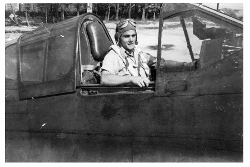
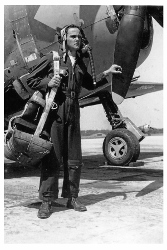
P-40F
P-47
Bud Coward- "K"/3BnStaff...his Dad, Capt. W. Allan Coward- USAAF...a 1941 Clemson Grad...in 1942 he was assigned to the 316th Fighter Squadron, 324th Fighter Group. He flew P-40Fs in North Africa and Italy. In the P-40, he could not out-climb the FW-108s or the ME-109s but
could certainly out-dive them, which he did many times! On his last of 79 combat missions, in January 1944, he was shot down over Anzio, but lived to fly again and
instruct in P-47s. I miss my Dad very much.
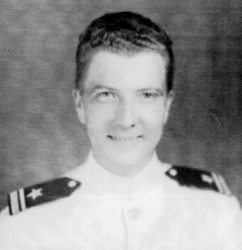
Bob Alford- "A" Company...his Dad, George Robert Alford...like many, my Dad was mostly silent. He was well into his thirties when he was commissioned into the Navy.
Most likely, he was one of the oldest Ensigns. He was stationed on Guam, serving as Admiral Nimitz's Communications Officer. A nice bit of legacy that he will be looking down on from above, my son has committed
to joining the Navy and at his commissioning in Newport during the summer of 2014 he will wear the same uniform brass that his grandfather wore at his
commissioning some 70 years before.
Mike Freeman- "O"/4BnStaff...his Dad, Elmer "Easy" Freeman...My Dad was a B-26 pilot. He was shot down over France, was initially hidden by the French underground,
but was turned in to the Gestapo in Paris by a Danish traitor/double agent. He spent 3 months in Buchenwald Concentration Camp until he was moved to Stalag
Luft III. His story is featured in the documentary "Lost Airmen of Buchenwald" directed and produced by my nephew, Mike Dorsey. The movie has been in
many film festivals and was shown on the Military Channel and will be shown at the WW II museum in New Orleans on 26 March. Also available on NetFlix.
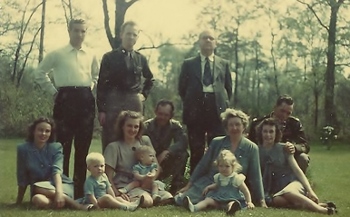
George Olney- "D" Company...his Dad, George Washington Olney...My Dad landed on Biak, New Guinea, on the second day. He remained there until the end of the war, commanding
a Harbor BOat Company as a combat engineer. It took a while to gain control of the island and Dad saw and did a lot he never talked about except to me, when
I was taking care of him before he died. You have to have been through a war yourself to understand some of it and why. By the way, he was a Porter Military
Academy Grad. IN THE PICTURE: Mom and Dad are on the right. Grandfather Courtney is standing in the coat and tie. Uncle Dick is in "Pinks"- USAAF (USAF)- Class of 1940.
His son, also Dick was the Class of 1965.
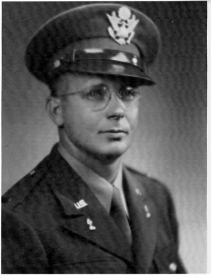
Jimmy Holloway- "K" Company...his Dad, James M. "Jimmy" Holloway This one is a bit different. Because my grandfather made some really bad financial decisions in 1910, my Dad
was born in a sharecroppers cabin in rural Georgia in 1916. When he finished high school, there was no money for college. He became a meat cutter and wound up
in a grocery store in Greenwood. When the war broke out, the car dealers in Greenwood concluded that cars would not be available for a while and started a National Guard
maintenance battalion. Owners were the Senior Officers, mechanics, the NCOs, etc. My Dad, the meat cutter, joined as the cook. The unit was called up to Fort
Jackson to get proper military training before deploying.
At Fort Jackson, the Army administered the standard battery of tests to all enlisted. Dad scored highest in the unit. So the Army took the cook,
with no college classwork and no maintenance experience, and sent him to Aberdeen and Maintenance Officer OCS. He eventually ended up in maintenance battalion
in General Patton's 3rd Army, overseeing repairs to tanks and trucks of The Red Ball Express. When the fighting ceased, maintenance needs wound down. Dad was
assigned to be the Commanding Officer of a Prisoner of War camp in East France that was near a massive war salvage yard. To keep the prisoners busy, he had some of
his old vehicles to be brought to the camp. He found some of the "not so badly damaged" sedans for the P.O.W.s to work on, restoring several to working order.
One day a U.S.O. tour bus stopped at the camp looking for some cars. The entertainers included Mickey Rooney. Dad traded two sedans for some musical instruments.
Thereafter, the prisoners had a band and learned to play "Pennies from Heaven". When he returned home in mid- 1946, Dad went back to cutting meat.
Ed Piper- "E" Company....his Dad, George Heath Piper...I am inspired by all the stories of our fathers. Like the rest of my classmates, I had no clue at our time together at The Citadel
that our class repersents the sons of the greatest generation of quiet heroes. That may be why we survived so well under the unbelievable 4th Class System our Knob year.
My father has never talked about his experiences in WW II. I just learned some information when he, like many WW II veterans, was interviewed and video taped for a
documentary that was aired on TV about WW II a couple of years ago.
My father was raised a cotton farm near Aiken, SC. He was drafted into the Army at age 18 just out of high school in 1942. He, like all young men at this time who were raised
on a farm, never killed anything other than animals for eating. We was a good shot with a shotgun and rifle. Little did he know how valuable this skill would be
needed for survival. In Europe, he was in an infantry division under General George Patton and fought in France, in the Battle of the Bulge, and in the Netherlands.
In one battle that went on for days, food and ammunition ran out. He was in a foxhole with many infantrymen when a mortar round hit their position. All were killed except
my Dad. He and the rest of the unit resorted to hand-to-hand combat fighting with bayonets. Soon thereafter, his unit was ambushed and literally had to fight by hand; Dad actually
had to kill a German Lieutenant by strangling him. After the war my father came home, married, worked my grandfather's farm, attended church, and became a Sunday School teacher
for many years; and he worked as a supervisor at the Savannah River Plant neat Aiken. Yes, our fathers are quiet heroes.
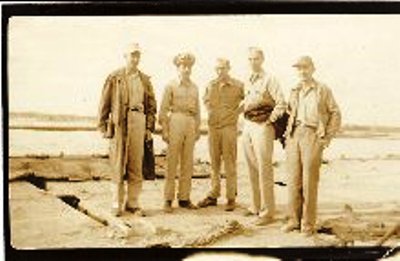
DAD IS ON THE FAR LEFT- ON BOARD THE "MISSY" AT THE BATTLE OF OKINAWA
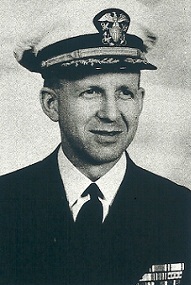
Lucky Lane- "H" Company...his Dad, Rear Admiral Richard Lane, US Navy, Ret- Naval Academy Class of 1933...Pop was teaching at the Naval Academy when
Pearl Harbor happened. That ended his teaching stint at "Canoe U" pretty quickly, as he was them assigned to the battleship USS Mississippi- an old WW I "four Stacker"
which had just been taken out of moth balls for service in the big WW II. He was the gunnery officer on the "Missy". He served mostly in the Pacific, participating in the
battles of Palau, Leyte Gulf, Surigao Straits- where the "Missy" was the "Flag Ship of the Line- , the Lingayen landing, and finally, the Battle of Okinawa. At Okinawa, the
"Missy" was credited with the ultimate destruction of the Shuri Castle defenses. Since Pop was the gunnery officer, that meant much of that distinction had to be because
of his leadership.
Pop was on board the USS Missouri, in Tokyo Bay, on Sepember 2, 1945, to witness the Japanese surrender. I have a picture in my office of the ceremony, personally signed by
Admiral Chester Nimitz, whom my Dad later served under. At the desk on the Missouri is Admiral Nimitz signing the surrender document on behalf of the USA, behind him,
at the microphone, is General Douglas MacArthur, and behind hip is General Jonathan Wainwright. Pop is amongst the officers standing around, witnessing this historic event.
Decades ago, wgen I was reading about the Battle of Leyte Gulf, I asked Pop about his recollection of that experience, especially as the Japanese were hurling 16 inch shells
at the "Missy". All he would say was (and he was a man who never, I mean almost NEVER used cuss words)..."Son, I was scared shitless!!" Those five words are all
that he ever told me about his entire wartime experiences. Pop stayed in the Navy and retired in 1958 as a two star. He passed away in 1994. All those who knew him
will tell you that he was a man of great moral strength and courage, but a man of few words. At Pop's funeral EIGHT (yes, I counted them myself) of his Academy Classmates
came to say "goodbye". They were all in their eighties, so they came in their walkers and their oxygen tanks but they came. I was impressed. Excuse me, Classmates, but
I tear up a bit whenever I think of my Pop.
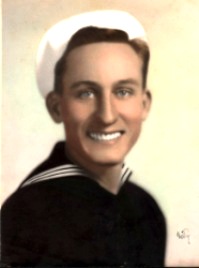
Mike Byrd- "G" Company...his Dad, Carlos Edwin Byrd...After reading about and being inspired by so many "silent heroes", I decided to tell the story of my father.
He died in 2010 without ever telling me anything about his war experiences, which ended on a destroyer off the coast of Japan when the Japanese surrendered. Daddy survived
the Battle of Coral Sea, Midway, Okinawa, and the Japanese Mainland.
The photo, at the top of the page, is from Life Magazine. That is my father sitting on the edge of the forward fire control below the bridge of the Yorktown (CV5)
at The Battle of Midway, one of the greatest naval battles ever and was the turning point of the war in the Pacific. My father was 87 before he could talk about any of this
and then only to my mother after he saw his old battle station on the cover of National Geographic Magazine. This was after they found the Yorktown at the bottom of the
Pacific. A Japanese Dive Bomber had just flown down the stack into the flight deck...it's bomb went through the flight deck into the boiler before exploding. Dad's
battle station controlled the 6 inch guns at the front of the ship and one wave of Kamikaze planes had passed. During the lull, he had a terrible headache so he decided to go to sick bay
to get something for it. As he was climbing down the ladder he glanced to the right at the nearby 40mm aintiaircraft gun mount. Two sailors there (one to deflect the gun
and the other to move the mount right and left) were good friends. There were two blackened torsos...one without a head and the other without legs. Immediately his
headache was cured. He wenr back to battle station, and shortly afterward a wave of torpedo planes came in. Several torpedoes struck the ship, which was dead in the water.
When the order to abandon ship was given, Dad initially got in a life raft, but an African American cook who could not swim was in the water nearby. My father
got out of the raft and gave the cook his place. After about 6 hours in the water, a destroyer picked them up and they were taken to Pearl Harbor. Dad's brother
was stationed at Pearl and met all the arriving ships which had survivors. Dad walked right past him without Uncle Lane recognizing him as he was still covered
completely by fuel oil. Dad had swallowed so much oil and seawater he could hardly walk. The survivors were quarantined for 3 months so no word of the Yorktown's
sinking would reach the Japanese. The Japanese did know that they had lost four of their best aircraft carriers: the Yorktown's dive bombers helped sink
3 of them.
|

